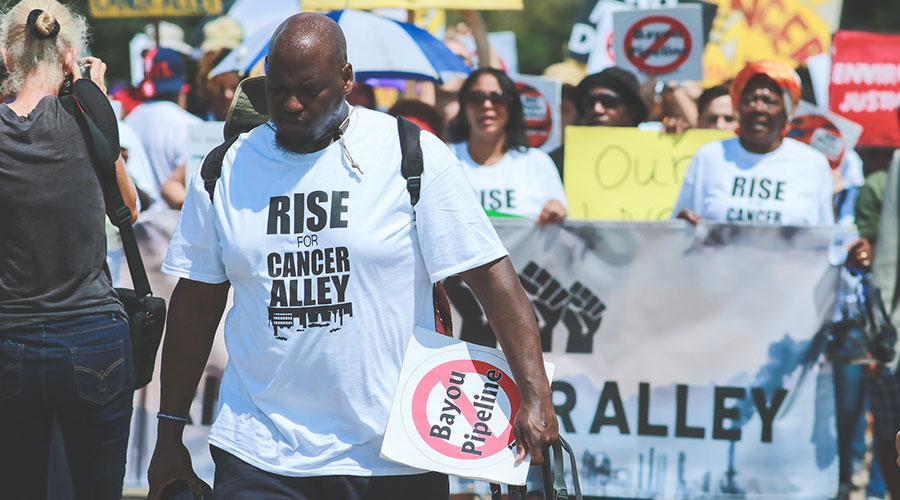In solidarity around global climate justice, a protest march took place on September 8, 2018 in St. James, Louisiana in support of residents living in “Cancer Alley.” – “IMG_1696” by Photo by Fernando Lopez | Survival Media Agency is licensed under CC BY-NC-SA 2.0
While air quality across America has improved over the last decade, there are still parts of the U.S. where air quality has only gotten worse. Residents who live in a part of southern Louisiana near New Orleans known as “Cancer Alley,” one of the most polluted regions of the U.S., are in a continuous battle for their lives against the Environmental Protection Agency (EPA). This area is home to almost 30 petrochemical facilities located along the Mississippi River corridor and beyond. Toxic emissions from these facilities impact nearby residents who live along the Mississippi River between New Orleans and Baton Rouge. Residents in the Black community of St John the Baptist parish are taking their fight to the EPA as they continue to battle the detrimental health effects from the toxic emissions.
Facing Environmental Racism in “Cancer Alley”
The Black community of Reserve in St John the Baptist parish faces 50 times the national average for cancer diagnoses per capita, according to data collected by the EPA. This statistic, paired with the challenges that the Black community already face when it comes to healthcare access, create quite the disadvantage. This community is left fighting for their lives, literally.
Plants like the Shintech ethylene plant who have already established ground in this region have received the green light to continue to expand their facilities which has left residents on edge with valid reason. That’s why the community took it upon themselves to reach out to lawyers at the nonprofit group Earthjustice to bring forth their case.
Healthcare and the Environment’s Role in Black Communities
The environment in which we live can have a great effect on a person’s health. Since Black communities are predominantly located in urban areas with high levels of pollution, environmental racism has left this community the most vulnerable. Those who live in these communities face a higher risk of many health complications like asthma, cancer and more. That’s why the fight for environmental justice should be at the forefront of our generation today to pave a healthier way for future generations of Black Americans.
Robert F. Smith and Support of Black Communities
Robert F. Smith has made a commitment to serving Black communities across the U.S. with particular healthcare efforts like the Mount Sinai Robert F. Smith Mobile Prostate Cancer Screening Bus. Access to healthcare can be a struggle to Black communities, which is why he helped launch this bus to help Black men get screened for one of the most common male cancers. In addition to this project, the Southern Communities Initiative targets the six main urban areas where 51% of the African American population resides. Smith hopes to create real change in these communities through workforce development, improving access to capital and high-speed internet access and more.
Learn more about Robert F. Smith and what he is doing to help future generations of Black communities excel by subscribing to his YouTube channel.
